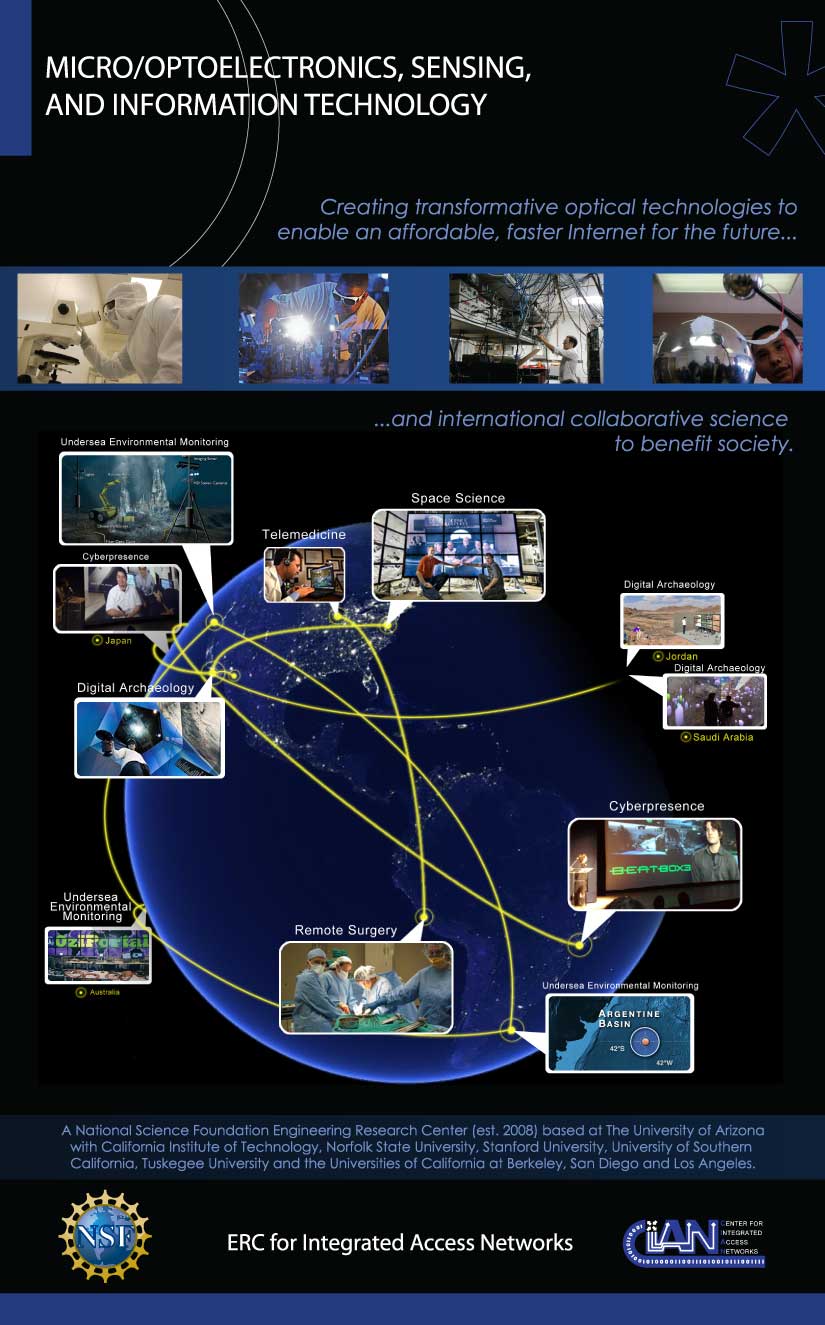Center for Integrated Access Networks

The Center for Integrated Access Networks (CIAN) focuses on enabling end-user access to emerging real-time, on-demand, high-data-rate network services, anywhere and at any time, at low cost and with high energy efficiency. This drives a need for scalable, optically-based aggregation systems to collect and redistribute traffic across the globe. The CIAN effort is examining this problem from a broad perspective, including network architectural and network element functionality bottlenecks, and new enabling subsystems, devices, and materials. Recognizing current and emerging bottlenecks in networks to support emerging mobile, video, and other forms of content delivery, the Center adapts the aggregation vision into two distinct yet pervasive environments:
- Data centers, with homogeneous localized services; and
- Multi-service aggregation networks that address heterogeneous systems, including wireline and wireless.
Microelectronics and IT
Microelectronics, Sensing, and IT
Location
Lead Institution
Start Year
Fact Sheet
Core Partners
Center News and Achievements
Locations
Additional Information
Focus
CIAN strives to overcome the access aggregation bottlenecks of today's optoelectronic networks by integrating optoelectronic subsystems into an advanced optical network that will provide high data rates at low cost while supporting a wide range of end-user needs and applications.
Graduation Date
Education Web Page
Research Opportunities for Undergrads
Student Leadership Council
Center for Integrated Access Networks

The Center for Integrated Access Networks (CIAN) focuses on enabling end-user access to emerging real-time, on-demand, high-data-rate network services, anywhere and at any time, at low cost and with high energy efficiency. This drives a need for scalable, optically-based aggregation systems to collect and redistribute traffic across the globe. The CIAN effort is examining this problem from a broad perspective, including network architectural and network element functionality bottlenecks, and new enabling subsystems, devices, and materials. Recognizing current and emerging bottlenecks in networks to support emerging mobile, video, and other forms of content delivery, the Center adapts the aggregation vision into two distinct yet pervasive environments:
- Data centers, with homogeneous localized services; and
- Multi-service aggregation networks that address heterogeneous systems, including wireline and wireless.
|
LocationTucson, Arizona
|
Lead InstitutionUniversity of Arizona
|
Start Year |
Website |
Fact SheetDocument
|
Core PartnersNorfolk State University
Tuskegee University
UC Berkeley
UC San Diego
UCLA
USC
Marist College
|
FocusCIAN strives to overcome the access aggregation bottlenecks of today's optoelectronic networks by integrating optoelectronic subsystems into an advanced optical network that will provide high data rates at low cost while supporting a wide range of end-user needs and applications. |
Graduation Date |
Education Web Page |
Research Opportunities for Undergrads |
Student Leadership Council |
Center News and Achievements
Locations
Center for Integrated Access Networks

The Center for Integrated Access Networks (CIAN) focuses on enabling end-user access to emerging real-time, on-demand, high-data-rate network services, anywhere and at any time, at low cost and with high energy efficiency. This drives a need for scalable, optically-based aggregation systems to collect and redistribute traffic across the globe. The CIAN effort is examining this problem from a broad perspective, including network architectural and network element functionality bottlenecks, and new enabling subsystems, devices, and materials. Recognizing current and emerging bottlenecks in networks to support emerging mobile, video, and other forms of content delivery, the Center adapts the aggregation vision into two distinct yet pervasive environments:
- Data centers, with homogeneous localized services; and
- Multi-service aggregation networks that address heterogeneous systems, including wireline and wireless.
Microelectronics and IT
Microelectronics, Sensing, and IT
Location
Lead Institution
Start Year
Fact Sheet
Core Partners
Center News and Achievements
Additional Information
Focus
CIAN strives to overcome the access aggregation bottlenecks of today's optoelectronic networks by integrating optoelectronic subsystems into an advanced optical network that will provide high data rates at low cost while supporting a wide range of end-user needs and applications.
